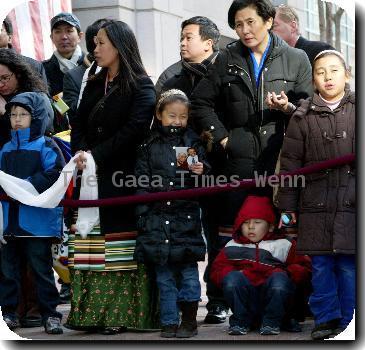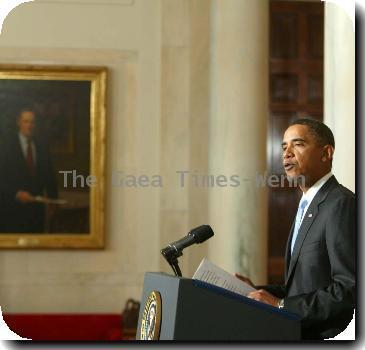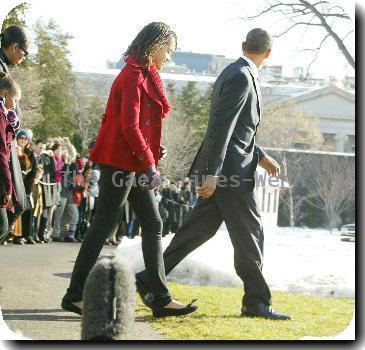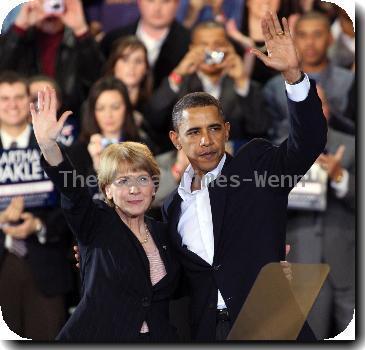Fired-up conservatives assail Obama, but inner divisions could hamper November election gains
By Liz Sidoti, APThursday, February 18, 2010
Excited GOP: Energy on the right, divisions within
WASHINGTON — Conservatives seem more fired up than they’ve been in years, rallying against President Barack Obama. But energy alone won’t herald a Republican revolution, and the excitement pulsing through the GOP base masks disputes and divisions the party faces ahead of critical midterm elections.
“I think 2010 is going to be a phenomenal year for the conservative cause, and I think Barack Obama is a one-term president,” former Vice President Dick Cheney declared Thursday, making a surprise appearance at an annual gathering of conservatives and earning a raucous reception.
This year’s political environment certainly seems unfriendly for the Democrats who control the White House and Congress, and Republicans are poised for big electoral gains following recent statewide victories in Massachusetts, New Jersey and Virginia. Yet, fights within the party could hinder the GOP’s prospects come November. So could the lack of both a leader and a message other than anti-Obama.
Along with the right wing’s new fervor, the GOP’s struggle to find a unified voice was clear from the start of the annual three-day Conservative Political Action Conference — both in the speaker whom organizers chose to deliver the keynote address but also in what he had to say.
“America already has a Democrat Party. It doesn’t need two Democrat parties,” said Marco Rubio, suggesting that Republicans who don’t adhere to certain principles — namely his Senate primary opponent Charlie Crist in Florida — are no different from Democrats. Rubio added: “People want leaders who will come here … and stand up to this big-government agenda, not be co-opted by it.”
In the Senate race that typifies the GOP’s identity crisis, Rubio is backed by grass-roots groups in his bid against Crist, the establishment-favored governor once considered a shoo-in for the nomination. Given a national platform, Rubio gave a speech that contained several criticisms of Crist, though not by name, and that was met with much enthusiasm.
Such bitterly contested primaries underscore the short-term and long-term challenges facing Republicans.
“There is still a struggle within the Republican Party over who we are and what we stand for,” acknowledged Sen. Jim DeMint of South Carolina. Then he took on GOP senators he believes don’t fight for individual liberty, smaller government and lower spending, telling the crowd: “It’s a fight between those who take their constitutional oath seriously and those who don’t.”
“I would rather have 30 Marco Rubios in the Senate than 60 Arlen Specters,” DeMint added, referring to the moderate Republican-turned-Democrat of Pennsylvania.
The problems don’t end at such squabbles.
Republicans have no unifying leader like Ronald Reagan. There are many big voices in the mix, including TV’s Glenn Beck and 2008 vice presidential nominee Sarah Palin. But there’s no unifying message like the Contract with America that was credited with helping the GOP take over Congress in 1994.
Also, antiestablishment “tea party” coalitions — largely made up of people with conservative and libertarian views — aren’t pledging allegiance to the Republican Party. But GOP chairman Michael Steele is trying to bring them into the fold; he recently held an hours-long meeting with several “tea party” leaders.
“Let’s say to the Republicans: ‘Will you show us you know how to be you?’” said Dick Armey, the former House majority leader from Texas who has seemed to take on the de facto “tea party” leader role — even as he insists he doesn’t want it. “They must come to us and show they’re worthy of our loyalty. We don’t come to them.”
Longtime GOP conservative leaders, meanwhile, are doing their own thing. They updated a statement this week defining the movement’s principles, saying: “We need a restatement of constitutional conservatism grounded in the priceless principle of ordered liberty articulated in the Declaration of Independence and the Constitution.”
It’s clear that one thing the GOP has going for it — perhaps the biggest thing — is an awakened conservative base that’s taking on Obama at every turn. It’s a shift from recent years, when the party’s right wing was depressed during George W. Bush’s second term and GOP nominee John McCain’s candidacy. The Arizona senator never was a darling of the right.
Organizers of the conservative gathering here this week say they expect some 10,000 activists and leaders to attend over three days.
In a hotel ballroom packed with a riveted audience on Thursday, speaker after speaker lambasted Obama over everything from his policies — what they called his big-government, big-spending agenda — to his style, including his use of teleprompters while giving speeches, even as they spoke from a podium outfitted with the devices. Some used them, some didn’t.
“The Barack Obama honorary teleprompters are here today,” David Keene, the chairman of the conference, said as he welcomed the crowd, drawing cheers.
Armey tagged Obama: “The most incompetent president perhaps in our life time.” DeMint said he feared that under Obama, “America is teetering toward tyranny.”
And Liz Cheney, one of the former vice president’s daughters, assailed Obama for “incompetence, misjudgment and neglect” leading up to the attempted terrorist bombing on Christmas.
One speaker even raised the president’s acknowledged drug use as a youth.
“Our notion of freedom doesn’t consist of snorting cocaine, which distinguishes us from Barack Obama,” said Jason Mattera, who wrote “Obama Zombies: How the Liberal Machine Brainwashed My Generation.” He went on to add: “On the cocaine front, I do believe many young people in America view Barack in the same fashion they view drugs: It was a substance to experiment with.”
Tags: Barack Obama, Geography, North America, Occasions, Parties, Political Organizations, Political Parties, Sarah palin, Senate Elections, United States, Us-conservatives, Washington








